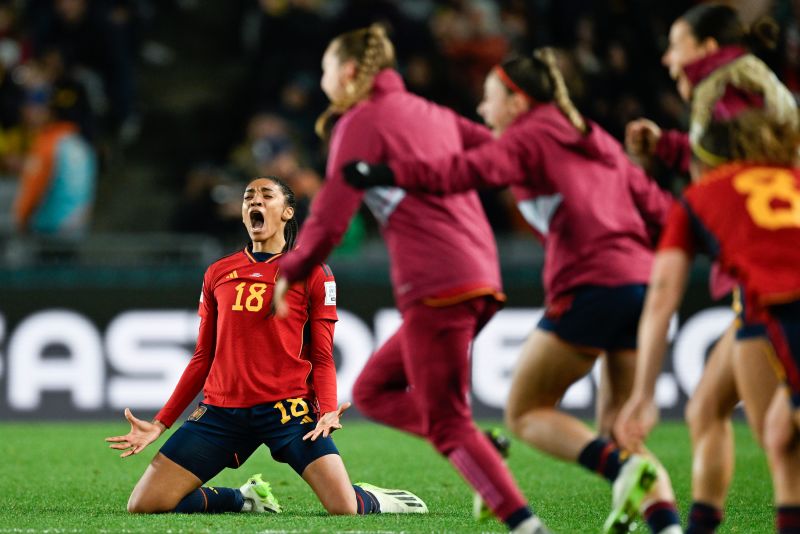
Spain reaches Women’s World Cup final for the first time with stunning win over Sweden
Spain created more history at the Women’s World Cup, shocking favorite Sweden to reach the final for the first time thanks to a dramatic 2-1 win in Auckland, New Zealand.
After the majority of the match ticked by without much of consequence to write about, three goals in the final 10 minutes set the semifinal before at Eden Park alight.
Teenager Salma Paralluelo seemed to have won it for Spain with an 81st-minute strike which broke the deadlock, only for Sweden to level with a brilliant goal from Rebecka Blomqvist in the 88th minute.
But with extra-time looming, Spain’s response was ruthless and immediate. Saving the best goal until last, Olga Carmona found the back of the net with a sublime effort from the edge of the box just 94 seconds after Sweden had made it 1-1.
Competing at just its third World Cup, Spain is now within a game of winning the sport’s biggest prize having never before progressed beyond the round of 16.
When asked what she was thinking about when standing on the pitch as the full-time whistle blew, Paralluelo told reporters: “My family, everyone that supports me, in them [the players], we deserved it. We’ve taken this little step, and now, we’ve got one more big push.
“We’ve just got the final left, we need to keep doing what we’ve been doing every match.
“We’ve been going from one challenge to another and now we have the last one – the big one – and we’re going to work hard to do it.”
So dominant were La Roja in possession against Sweden, a team ranked third in the world, and so impressive have they been in the knockout stages, they will be confident of victory against either Australia or England in Sunday’s final.
Sweden may have had the pedigree – only the US has appeared in more World Cup semifinals – but Spain had the creativity and the stardust.
Leading figures in Spain congratulated the team on its achievement. “To the final!” Spain’s Prime Minister, Pedro Sánchez, wrote on X, formerly known as Twitter, while Spain’s men’s World Cup winner Andrés Iniesta called the players “giants.”
Hollywood actor Antonio Banderas wrote on social media: “Bravo!!! Proud of this team of women football players with class, heart and faith in themselves. Thank you!!!”
A remarkable achievement
Spain’s ascent on the world stage is made all the more remarkable given the tumultuous year women’s soccer in the country has experienced.
Last September 15 players declared themselves unavailable for selection, saying they were unhappy with the training methods of head coach Jorge Vilda.
The Spanish football federation (RFEF) stood by Vilda and some of the players, including two-time Ballon d’Or winner Alexia Putellas, returned to the fold. After the 2-1 win over the Netherlands in the last eight, Vilda acknowledged the federation for its support, telling reporters: “Without that we would not be here. I’m quite sure all of this would not have happened.”
It says much about the depth of talent at Spain’s disposal that it has reached the final without some of the country’s best players and with Putellas starting for the first time at this tournament against Sweden, having been a substitute in the other five matches as she continued to find fitness and form after sustaining a serious knee injury last year.
Paralluelo makes an impact
It was Putellas’ replacement, the 19-year-old Paralluelo, a 57th-minute substitute, who contributed much to Spain’s victory.
Spain had monopolized possession prior to her introduction and had a couple of chances to take the lead – captain Carmona and Aitana Bonmati went close from distance in the first half
But Sweden’s defense wasn’t seriously threatened until Paralluelo’s cut-back in the 69th minute presented Alba Redondo with a brilliant opportunity to score from four yards out, only for the Spaniard to direct her shot into the side-netting.
Nevertheless, it was a warning to the Swedes whose best chance had come towards the end of the first half when Fridolina Rolfo forced a fine save from Spain goalkeeper Cata Coll from close range.
With the opening goal, Paralluelo – who had scored the extra-time winner against the Netherlands in the quarterfinals – became the second-youngest player to score in a Women’s World Cup semifinal and also sparked a dull contest into life.
Blomqvist’s third goal of the tournament looked set to have forced the match into extra-time before Carmona’s coup de grâce.
The heartbreak of defeat at this stage of the tournament is a familiar feeling for the Swedes who have now lost four World Cup semifinals and were undone this time by Spain’s only two attempts on target.
